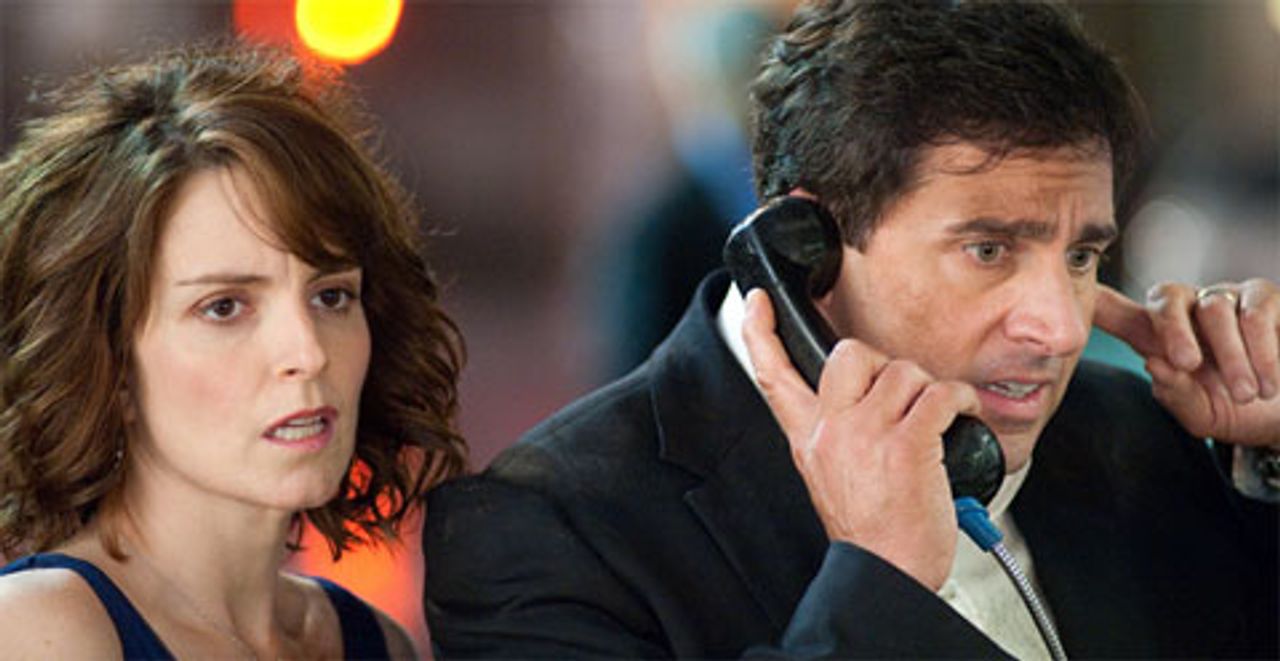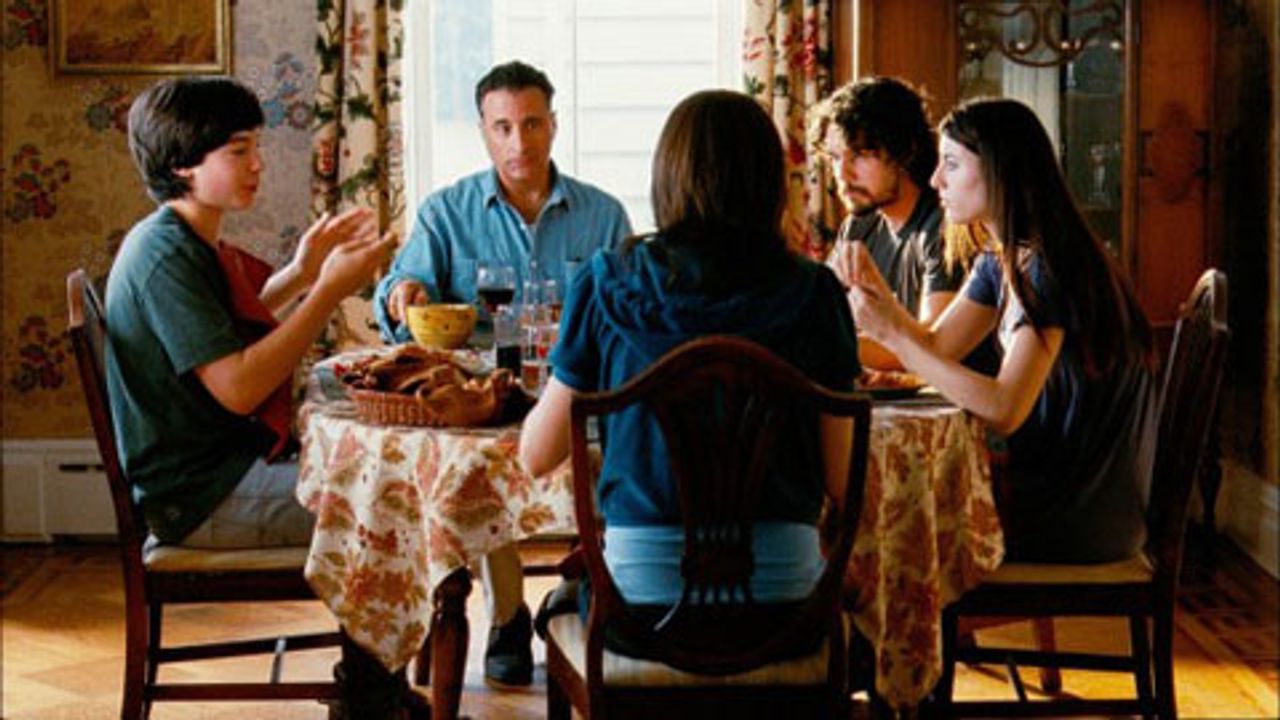Quality adult comedies have become a rarity; therefore, it was something of a surprise to find that two recently released adult comedies have received almost uniformly good reviews. Date Night deserves the acclaim, while City Island, which does have its inspired moments, is ultimately a disappointment due to its inability to decide the message it wants to convey or even what kind of movie it wants to be.
Date Night
 Date Night
Date NightDirector Shawn Levy’s Date Night is a refreshing contemporary screwball comedy in which the male and female leads, Steve Carell as Phil Foster and Tina Fey as his wife Claire, are both the movie’s love interest and its source of comedy. Much of the comedy arises from the couple’s conflict with a world—specifically, the world of New York City—turned upside down, another feature of screwball comedy. Improvising from Josh Klausner’s first-rate script, Carell and Fey make this conflict believable and genuinely funny.
They are surrounded by a fine supporting cast whose ability to ground their characters in reality makes the humor of an inverted world all the more genuine. Even when Date Night succumbs to using what have become contemporary comedy clichés, they are used in parodic fashion.
For the Fosters, married life has become stale and predictable. In an effort to carve out a little time from their financially rewarding but emotionally empty jobs (he is a tax accountant and she is a real estate agent) and two small, demanding children, they plan regular date nights that also become routine and predictable until one night when they decide to try an upscale restaurant in New York city. A case of mistaken identity leads them down a rabbit hole world of a corrupt New York City run by the Mafia. In the process of helping the remaining good cops turn New York right-side up, the Fosters also solve their marital problems.
There are two varieties of love interest/married couple in screwball comedies. One is the “deranged” couple whose behavior unveils the corruption and self-interest of the seemingly normal bourgeois world, an example of which is Leo McCarey’s The Awful Truth (1937), starring Cary Grant and Irene Dunne. The other is the logical, common-sensical couple dropped into a very illogical world; Frank Capra’s Arsenic and Old Lace (1944), starring Cary Grant, again, and Priscilla Wright, comes to mind. The success of both varieties depends greatly on the actors’ improvisational skills.
Carell and Fey bring their improvisational skills, honed on television—e.g., Saturday Night Live, 30 Rock, and The Office—to the latter variety. Perhaps the best example of these skills occurs early in the movie during a date night scene at a restaurant where the Fosters fight off boredom by inventing stories about the personal lives of other couples at the restaurant (a series of outtakes from this scene shown at the end of the movie establishes the scene’s improvisational nature). The stories create hilarious but accurate verbal portraits of contemporary types, while saying a great deal about the unsatisfactory lives that the Fosters themselves are living.
The supporting characters in good screwball comedies are also types, but types true to real life. Date Night continues this tradition, from the Fosters’ self-centered, fast-talking teenage baby sitter, Kay (Leighton Meester), to two corrupt cops, Armstrong (Jimmi Simson) and Collins (Common), whose efficiency (relative to the corrupt cops normally found in contemporary comedies) plays humorously against the ineptness of the Fosters (particularly so in a night scene in Central Park).
Mark Wahlberg’s Holbrooke, who is quite at home in the upside-down world of Date Night, also plays humorously against his own type as well as the out-of-their-element Fosters. Always shirtless, the well-muscled Holbrooke elicits several “Can you please put on a fucking shirt?” from the shirted, not-so-well-muscled Phil. Surprisingly, Holbrooke is also a computer geek (while Claire knows a flash drive only as a “computer thingy”), and he uses this expertise, as well as his connections to the New York underworld, to help the couple survive a corrupt New York City.
Date Night does stoop to clichés, but as a means of parodying movie and cultural conventions. The appearance at the upscale restaurant of snobbish, ignorant waiters and hosts, a staple of contemporary comedies, becomes the occasion for a grand send-up of Andy Warhol’s 1960s New York when the Fosters don their best hipper-than-thou attitudes. The obligatory car chase scene appears at the end of the movie, and one wonders if any filmmaker, after having seen it, will dare use this cliché again.
City Island
 City Island
City IslandDirector Raymond De Felitta’s portrait of a dysfunctional family in City Island has been compared favorably to one of the better American comedies of the past decade, Little Miss Sunshine. However, most of City Island recalls too much of the earlier movie, and not in a good way. By the time De Felitta’s movie finds it own legs, one is not sure what to make of the director’s intentions.
The Rizzo family members are living separate lives because each is lying to the others about his or her real but secret life. Vince Rizzo (Andy Garcia) is a corrections officer taking acting lessons clandestinely; his daughter, Vivian (Garcia’s real-life daughter Dominik Garcia-Lorido) is hiding the fact that she has taken a job as a pole dancer to pay for college; son Vince Jr. (Ezra Miller) hides the fact that he spends most of his time on an Internet site devoted to BBW (Big Beautiful Women); while Vince’s wife Joyce (Julianna Marguiles), frustrated by the lack of real attention from both her double-dipping husband and children, secretly smokes.
This situation changes when Vince brings home a prison inmate whom he discover is his long-lost son from a previous marriage—another secret he has kept from his family and keeps from the son until the movie’s end. As an outsider, son Tony Nardello (Steven Strait) can see the family’s problem clearly, and acts as an agent of change by encouraging each member to be honest with him or herself. Other non-family members, notably Molly (Emily Mortimer), a female friend of Vince’s from the Actors Studio, also help the Rizzos to understand that it’s not their secret desires but the repression of these desires that’s unhealthy.
Like Little Miss Sunshine, much of the first half of the movie is devoted to establishing the characters and their problems. But many of these scenes are short and underdeveloped, just long enough to set up a zingy one-liner or two. Apparently, the filmmaker has made the decision to go for the quick laugh instead of taking the time to create situations from which the humor arises naturally and the audience can gain some sense of the characters’ complexities. In fact, except for Vince, the family members remain flat and unsurprising throughout the movie.
One gains the sense that De Fellitta never fully came to grips with the material at hand. Like the great majority of Hollywood movies, this movie is “homeless”; there is some early visual focus on the location, City Island, a small island that is part of the Bronx, New York City. We are told the natives are called “Clam Diggers” and those who come from New York City to buy cheap waterfront property are known as “Mussel Suckers,” but nothing is done with this information, nor is there any indication of how living in this unusual community has affected the lives of the Rizzos.
When Vince finally gets up the courage to try out for a movie (a Martin Scorsese film starring Robert DeNiro) and discovers that acting is about arriving at the truth by “lying”—i.e., reinventing a real person’s voice or story (a discovery for which Vince is rewarded with his first acting job)—the movie turns serious and appears to be standing on its own two legs. The dialogues between Vince and his friend Molly are particularly noteworthy for their exploration of deeply felt emotions and memories.
In fact, because the movie devotes so little time to exploring the foundation of the relationship between Vince and his wife, one expects City Island to end with Vince and Molly forming a loving relationship, or at least some remorse on Vince’s part that such a relationship did not evolve, but neither occurs. Instead, the conclusion attempts—unsuccessfully—to blend the comic tone of the first half with the serious tone of the second.
